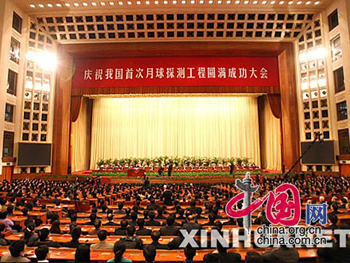President Hu Jintao pledged Wednesday that China would adhere to the principle of peaceful development and use of outer space in concerted efforts with other nations.
At a grand ceremony in the Great Hall of the People to celebrate the success of China's first lunar probe Chang'e-1, Hu reiterated that peaceful use of outer space was a shared cause of the mankind and accords with the common interests of the mankind.
"China's deep space exploration aims solely for peaceful purposes," he said.
China will actively participate in international space cooperation, continue to make breakthroughs in deep space exploration and try hard to make more, new contributions to technical progress and to the sublime cause of the peace and development of the mankind, Hu added.
He said the success of the first stage of China's lunar probe program indicated the nation had joined countries with capability of deep space exploration.
Hu noted the lunar probe was another milestone in China's space exploration, following the successes of man-made satellites and manned space flights.
It was also another symbolic result of China's efforts to enhance self-innovation and build an innovative nation and a historical stride the nation made in its way toward world's peak of science and technology, Hu said.
The development of the nation's scientific and technological strength must be based on economic development, Hu said.
Only when development is regarded as the primary task of the Party in its ruling efforts, will new achievements be made in the development process and will the gap between China and world's advanced standards be narrowed, he added.
Enhancing capability of self-innovation is the core of China's national development strategy and the key to improving the overall national strength, according to Hu.
Development of the real core technologies in crucial fields that are related to the life line of the national economy and to the national security must rely on self innovation, Hu stressed.
Chang'e-1, named after a mythical Chinese goddess who, according to legend, flew to the moon, blasted off on a Long March 3A carrier rocket on Oct. 24 from the Xichang Satellite Launch Center in the southwestern province of Sichuan.
The satellite traveled nearly two million kilometers in its 15-day flight to the moon and reached its final working orbit with a fixed altitude of 200 kilometers on Nov. 7. The China National Space Administration released the first picture of the moon captured by Chang'e-1 on Nov. 26, marking the full success of the first stage of the country's lunar probe program.
Chang'e-1 was designed to stay on the orbit for one year, but scientists estimated that precise maneuvers may have saved 200 kg of the fuel and prolonged its lifespan.
The launch of Chang'e-1 kicks off the first step of China's three-stage moon mission, which will lead to a moon landing and launch of a moon rover at around 2012. In the third phase, another rover will land on the moon and return to earth with lunar soil and stone samples for scientific research at around 2017.
(Xinhua News Agency December 12, 2007)


